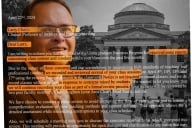You have /5 articles left.
Sign up for a free account or log in.
An Iowa State University professor whose class on applying Biblical principles to business was canceled now says he disagrees with parts of a controversial textbook he planned to use. That book was among the reasons faculty members cited when protesting the course, saying it was inappropriately religious for a public university.
Professor Roger Stover, who declined to speak with Inside Higher Ed for the initial story, wrote Wednesday that his class was to be “a critical evaluation of a popular book’s prescriptions.” The text, Dave Anderson’s How to Run Your Business by THE BOOK: A Biblical Blueprint to Bless Your Business, at one point advises Christians not to go into business with nonbelievers.
In a statement released to Inside Higher Ed Wednesday evening, Stover called that an “extreme recommendation." Stover added that “I professionally disagree with much of the book’s recommendation on borrowing money.”
The professor said he planned to focus his one-credit, independent study class on chapters like “Four Mandates to Maximize Your Time” and “How to Lead Through a Crisis.”
“This was a proposed business management class,” Stover wrote. “These are hardly theological issues – they are management issues.”
Stover’s course was called off after three Iowa State faculty members campaigned against it, saying it violated the separation of church and state. An award-winning finance professor, Stover has been on Iowa State’s faculty since 1979. He said suggestions that he designed the class to preach to students are unfounded.
“My intention was to have the students study academic management literature on the topics of the book and use that background to evaluate whether the author’s suggestions have any merit,” Stover wrote. “This form of inquiry is what business school faculty do all the time. Given the growth of interest in the role of spirituality in business management, our students may well be exposed to this in their career. I feel it is incumbent on us to prepare them for such exposure.”








